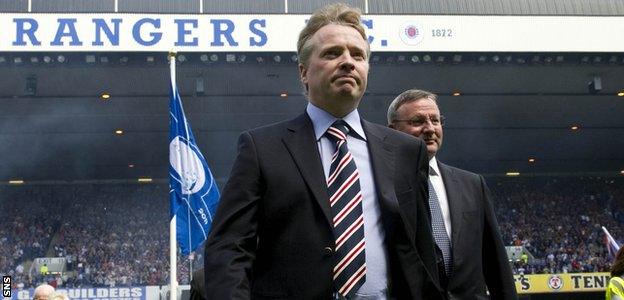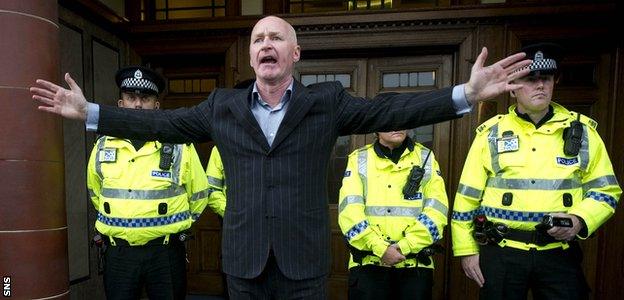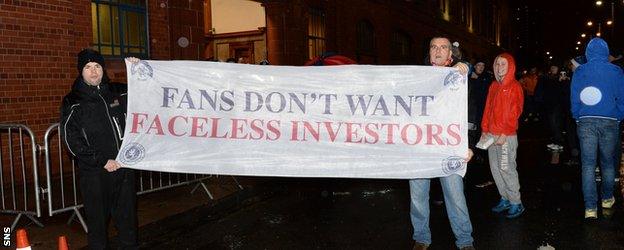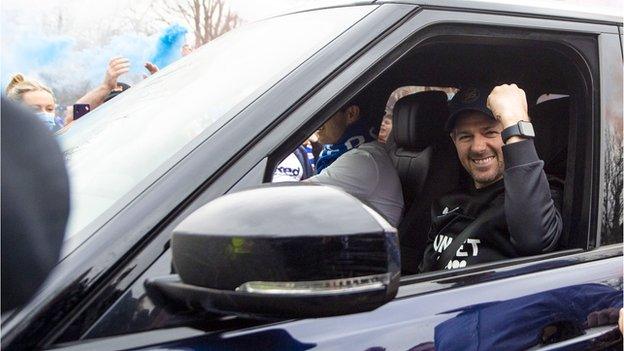Rangers: From the Banter Years to the glory season under Steven Gerrard - a decade like no other
- Published
'From 10 years of misery to this... bouncing' - Rangers fans celebrate at Ibrox
Bill Miller, the Tennessee tow-truck tycoon, had never been to Scotland before making a play to buy Rangers in 2012 - so, naturally, Scotland went to Bill Miller. He opened his door in Florida one day to find a tabloid journalist from Glasgow keen to talk to him about the life he'd led, the plans he had, the money he intended to spend.
Miller, a private man, said nothing, but then he didn't need to. The article that soon appeared had his story in detail, how he divorced his wife of 33 years in 2007, how court papers lodged in Fulton County, Georgia, cited irretrievable breakdown, how his ex (Lorraine), kept the house (five bedrooms) in the Atlanta suburbs and how he held on to the place in Florida, a waterside mansion with its own private boat dock, plus a luxury apartment with views of the ocean.
Bill never spoke to anybody about any of this but the word soon filtered through that he was spooked by the intrusion into his personal life and would be withdrawing his interest in Rangers, effective immediately.
Bill most likely hadn't the foggiest notion what he was letting himself in for the day he picked up the phone to Duff and Phelps, the club's administrators, and said he fancied buying a soccer team. Like so many others who expressed an interest in the post-Craig Whyte age - Andrew Ellis, Bill Ng, Jim McColl, Brian Kennedy and multiple other fleeting characters - Rangers people counted them in and counted them back out again.
They've finally closed the book on all of this. Rangers are champions of Scotland. They've won it in a landslide and with six games to spare. Many felt that one day they would end Celtic's monopoly of the title but few thought they would do it with the kind of excellence they've shown from the get-go this season.
Many goals for, not many goals against. A relentless nature has replaced a psychological vulnerability. Not counting last season's truncated Premiership, with half a dozen matches left to play they've already amassed more points than Celtic managed in four of their previous eight title wins. If they win four of their remaining six they'll hit 100 points, a haul that would trump all of Celtic's nine-in-a-row totals bar one, but even that 106-pointer, achieved by the Brendan Rodgers team in the invincible season, is attainable should Rangers win six out of six.
Steven Gerrard has done something that nobody would have readily predicted. There are some who would have believed in him from the start, believed in his capacity to turn around what many would have considered a noisy and dysfunctional club and make them winners again, but it's stretching credibility to say anybody could have foreseen them doing it in such style. Many of us have mea culpas to tell.
Whyte, Murray & a club for a quid
This is not a normal title win. To understand the scale of the achievement you have to go back in time, to get where the Rangers fans are coming from in their celebrations you have to know what they experienced in the decade that went before, the assorted characters and institutions who flitted across their landscape.
It went on and on. The judicial panel reports and the tax case hearings; Lord Carloway, Lord Rennie and Lord Nimmo Smith; Sir David Murray, Whyte and Charles Green; Imran Ahmad, the Easdales and Mike Ashley; the Blue Knights, the Three Bears and Bomber Brown; EBT and HMRC, administration and liquidation, oldco and newco; the City of London police and the Indonesian government; and a man wanted by Interpol.
The other day Gerrard remarked that Rangers had been to hell and back and he was right. Reliving hell is a necessary part of understanding heaven. And it starts with Murray. Little has been heard from him this past decade, but it was his commitment to the EBT scheme that kick-started the chaos at Ibrox. That and the financial hubris that came with it.
Murray had wanted out of Rangers for almost four years before finally finding somebody willing to take it off his hands - for a pound. He said at the time that he saw something of his younger self in Whyte, but really what he saw was a guy who was prepared to take the club on despite the threat of a massive tax bill coming down the line, the legacy of the EBTs. Some put it at £50m, others put it £75m. Whyte didn't seem to mind what it was. It became clear over time that he didn't care. He wasn't paying it.
Watch: The 77 goals that won Rangers the title
Seasoned campaigners at Ibrox pleaded with Murray not to sell to Whyte. The then chief executive Martin Bain produced a document on the supposed multi-millionaire and all it was missing was red lights flashing on every page. The Scottish FA's Judicial Panel investigation into the Whyte era concluded that Bain had expressed concern at the lack of due diligence being carried out by Murray and the Murray Group. "Mr Bain disclosed the contents of the investigation report into Craig Whyte and provided Sir David with a copy," the panel wrote.
"Sir David explained that he was under pressure from Lloyds to dispose of and release his shareholding in Rangers to Craig Whyte and that, in view of his overall financial position he was left with almost no option but to sell." Murray said later that he had been duped by Whyte. In his own tribunal of investigation, Lord Nimmo Smith had no time for the duped defence.
In the reports published by various law lords in the area of Murray's EBT scheme - dreamed up originally by Paul Baxendale-Walker, a one-time producer of adult movies - staff in the tax function of the Murray Group were heavily criticised by HMRC and accused of "active concealment of documents" and "a culture of defensiveness". It was only when the City of London police consulted with HMRC's criminal investigation section that documents could be seized from Ibrox. Five and a half years after the HMRC enquiry into the club's use of EBTs was set up they were still chasing documents from the Murray Group.
Murray had opened the gate to Whyte and Whyte drove right on through. Mortgaging future season ticket revenue was his vehicle. This was not a billionaire with wealth off the radar, as his handlers had suggested. This was a character whose modus operandi was to torch the debt attached to the club and to start again.
In an early interview, he said that administration would be nothing more than a regrettable event. When quizzed about forming a new company he stated that there would always be a Rangers.

Craig Whyte took over Rangers from Sir David Murray
Nanny McPhee, Bomber & the Dallas Cowboys
When Rangers sank into administration it wasn't because of the big tax case, as Whyte claimed, it was because he had not paid HMRC £9m in tax and VAT. In February 2012, the whole shooting match came crashing down. Murray blamed Whyte and Whyte blamed Murray and everybody else who caught his eye. If Rangers thought they were at rock bottom, worse was to come.
From day one it was obvious that Green was different. The new owner of Rangers began his reign by comparing himself to Nanny McPhee, the magical child minder from the Hollywood movie of the same name. Green trotted out Nanny McPhee's key reason for being: "When you need me, but do not want me, then I must stay. When you want me, but no longer need me, then I have to go."
He said what he liked and liked what he said. Green was a showman - and an unpopular one at first. He had John 'Bomber' Brown on his case for a start. The "Show Us The Deeds" speech on the steps at Ibrox has gone down in legend but at the heart of it was a well-placed concern. Green tried to move then manager Ally McCoist out the door and reaped a whirlwind. He got a death threat, he was roundly booed, folk wanted nothing to do with him - and he knew it.
Green's great ability was to tell people exactly what they wanted to hear. He managed to get McCoist back onside and persuaded a sceptical Walter Smith to join the board. Fan opinion started to shift and Green nudged them further when playing the populist card at every turn.

John 'Bomber' Brown addresses fans outside Ibrox in June 2012
He attacked the Scottish Premier League and the SFA for what he said they had done to Rangers. He rounded on other clubs for their supposed treachery in putting Rangers into the Third Division. He slammed the media for an anti-Rangers bias. All of this was grist to his mill. All of it was riotously acclaimed by many in the support.
Celtic fans knocked a lot of fun out of what they called the Banter Years - and Green gave them more ammunition than they knew what to do with. He claimed that Manchester United wanted Rangers in the Premier League - they didn't. He claimed that Barcelona and Real Madrid wanted Rangers in La Liga - they didn't. He claimed that Rangers were in talks with the Dallas Cowboys over a mega commercial deal - they weren't. He said that Rangers were targeting 15 players in the summer of 2012 and that five of them were internationals playing in the Euros - none of them arrived.
At a meeting of Rangers supporters groups he said that the club's global television reach was 500m people - roughly 7% of the world's population. He said that Rangers could generate £100m in television revenues every year - £34.9m more than Manchester City had generated when winning the Premier League the season before. He said that the Champions League group stage should be the minimum requirement for Rangers, that a place in the quarter-finals should be the target every other year. He could envisage the occasional semi-final spot.
He said all of this in a time when Rangers were losing league games to Stirling Albion, Annan Athletic and Peterhead. Then they lost in the Challenge Cup final to Raith Rovers. The season after that they lost in the Challenge Cup semi-final to Queen of the South.
Compare that to this campaign. Compare losing those games to the ones they've been winning in European competition. It's night and day.
Green was all about selling a vision that he could cash in on. He said it openly. He wanted to build up the club, do a share issue, sell it off and retire to a castle in Normandy. The reality was that Rangers were bleeding money on his watch, they were spending relative fortunes on wages just to get out of the Third Division and up the leagues.
The financial waste was extraordinary. McCoist, as manager, was on £825,000 in the bottom division. Ian Black was reportedly on £7,500 a week. Fran Sandaza was said to have been given a deal that would have seen him earn £10,000 a week had he not said some unwise things in a prank call with Tommy the Taxi Driver, a breach of contract that allowed Rangers to fire him.
Their wage bill was £7.8m. In the 13 months to June 2013 they recorded a loss of £14.4m. Despite his bombast, Green's demise was nigh, his shtick had worn thin on all fronts.
The Custards & the Easdales
The Green era was surreal, rivalled only by the tale of the baffled Northamptonshire clowns, Mr and Mrs Custard. The Custards, aka Bob and Julie Riley, came under attack when Rangers supporters mistook their 'bluenose' website as an attempt to profit from the club's crisis. The clowns hit the Scottish headlines, much to their own befuddlement.
This stuff is like another dimension in time compared to what exists at Ibrox now, including the hugely impressive leadership of Gerrard and the winning machine he has created. But it existed and that old culture had to be conquered. Murray had gone, but some of his old mindset remained. "When you make a decision to be involved at Rangers, there is no common sense to it," said Smith in the early days of the club's journey back to the top. "The financial bit at Rangers Football Club and common sense don't often go together."
That was the thinking that plunged them into a hole in the first place and it was the thinking that they needed to rid themselves of. When Graham Wallace became chief executive he sought to address the warped financial logic that existed at Rangers. "This was a business living beyond its means with a cost base out of proportion with its ability to generate income," he said at the time. "The costs have not been managed in the way they should have been."
Rangers went through chief executives and chairmen and directors and non-executive directors at a spectacular rate. Brian Stockbridge, the finance director who oversaw much of the spend in those early seasons, was one of the chief targets of the fans' fury. When the Easdale brothers, Sandy and James, assumed control they were majorly unpopular figures. At the 2013 AGM they were roundly booed as they got voted back into office. The supporters chanted, "Out! Out! Out!" as the board returned en masse.
The names came and went - David Somers and Norman Crighton, Derek Llambias and Barry Leach, the latter two connected to Sports Direct owner Mike Ashley. At one point the Indonesian government claimed they contacted Rangers to warn them off, external a man called Rafat Rizvi after they'd seen a picture of Rizvi leaving a Glasgow restaurant with an Ibrox board member. Rizvi was a convicted criminal, at one time wanted by Interpol.

Ibrox's main door saw several protests during the last decade
The King era & Gerrard's emergence
Dave King was always seen as the saviour in waiting. Previously a director at the club under Murray, King had made it big in South Africa. He was also the subject of the biggest tax dispute in the history of the Republic. Once denounced as a "glib and shameless liar" by a justice of the court in Gauteng province, King eventually settled with the revenue services. Having fought one monster battle, he was about to fight another one.
King went to war with the Ibrox board of the day - and he won. It was bitter, expensive and much of it was done in public, but that was the most monumental victory of them all, until Gerrard engineered the league title win. Even with King and others pumping money into the club in the manner of a medic using a defibrillator on a stricken soul, the response was slow.
He took control in March 2015, a season where Rangers failed dismally in their attempt to get out of the Championship and into the Premiership, a dour season that ended with Motherwell beating them 6-1 on aggregate in a play-off.
Rangers went through the managers, from McCoist to the caretaker Kenny McDowall to another caretaker Stuart McCall to Mark Warburton to the caretaker Graham Murty to Pedro Caixinha to the caretaker Murty to the caretaker Jimmy Nicholl. They finished third on their return to the Premiership, 39 points behind Celtic and lost 5-1 to Brendan Rodgers' side on two occasions.
They finished third again the season after, when the ultimately doomed Caixinha was in charge. They lost 4-0 and 5-0 to Celtic. Money was flying out of the door - Niko Kranjcar, Joey Barton, Clint Hill, Philippe Senderos, Carlos Pena, Fabio Cardoso, Eduardo Herrera, Dalcio.
When Rangers announced that Gerrard was their new manager some thought that the board had made another mistake. A great football man, no doubt. But being a manager is different. Especially if you haven't managed a club before. Especially if you haven't managed a big club. Especially one in Glasgow that is on its knees and up against the brilliance of Rodgers and his driven team.

Steven Gerrard arrives at the club's training ground after being confirmed champions
They endured more pain, but they had purpose now. As a club they started to make good decisions when Gerrard took over. Recruitment was sharper. The back room became a serious operation.
Gerrard had to work on the mentality of his players but he carried himself in a way that told you that he'd get there in the end. He focused on the job and not the circus around the job. He made players better, he inched them forward. Not far enough in 2018-2019 or 2019-2020, but he's done it now. A title secured in a thunderously impressive way - and the conclusion of the Banter Years.
The club's journey began with a Challenge Cup tie at Brechin on 29 July, 2012. They scraped it 2-1 after extra time. From there to here has been the dizziest ride, the power and glory in the here and now only heightened by the industrial scale pandemonium that went before. Gerrard, the rookie manager, is now the great redeemer.

DeLorean: Back from the Future: How a fairytale went horribly wrong
Snowfall: A new drug hits the streets of LA and changes the game forever...
